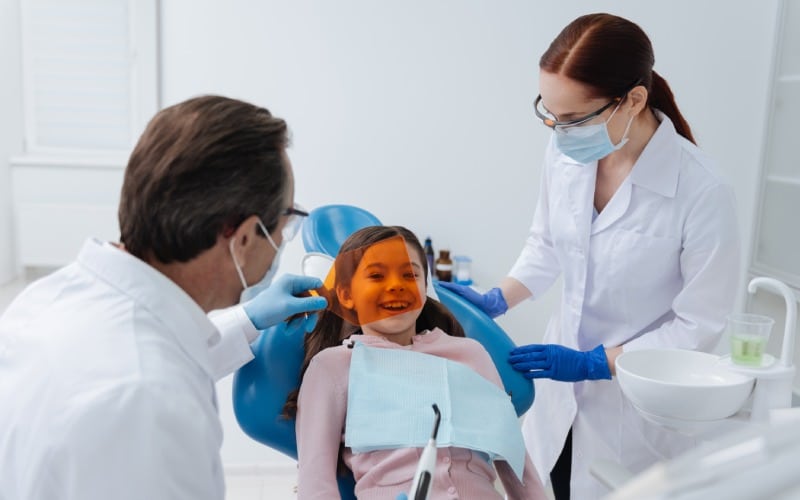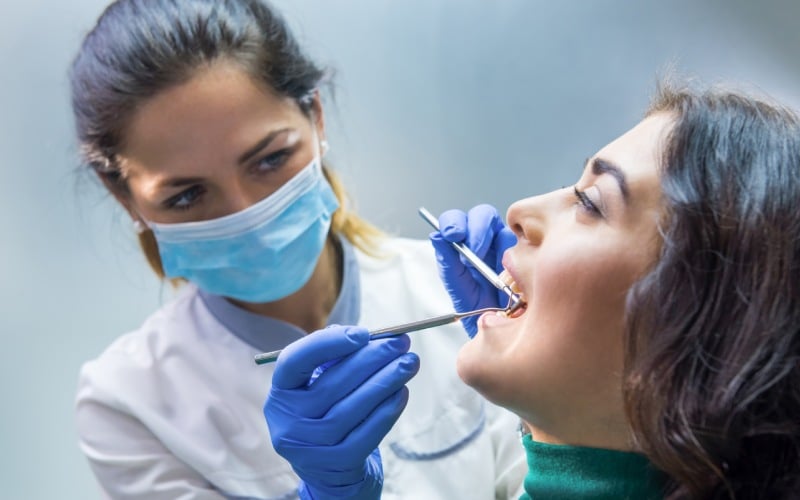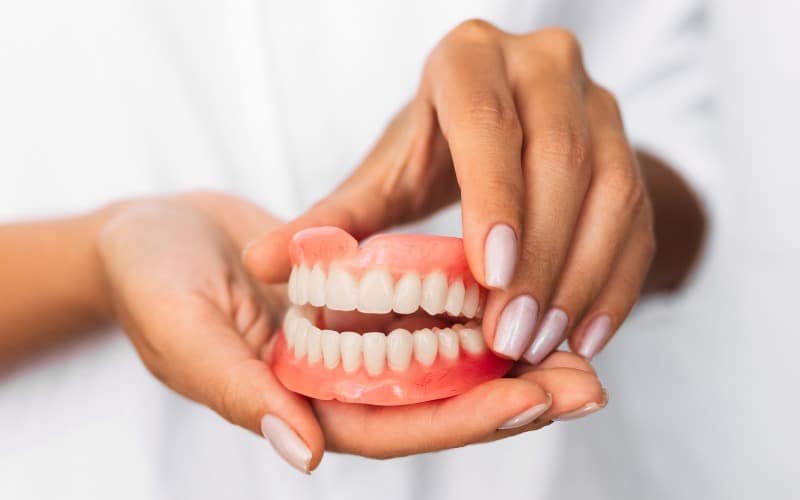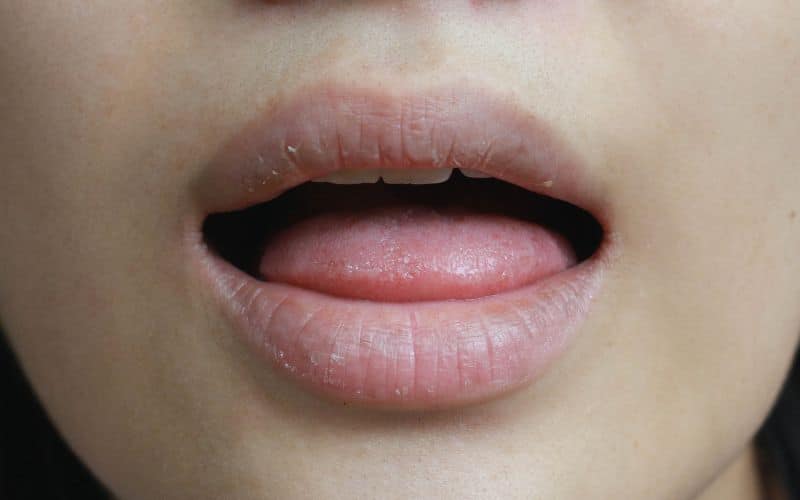
Why Is Dry Mouth Bad for Teeth and Oral Health?
- Posted on September 19, 2023
Causes of Dry Mouth
Several drugs and medications cause dry mouth as a side effect. This includes many drugs for allergies, high blood pressure, anxiety and depression, colds, asthma, and Parkinson's disease. Some diseases and infections can also lead to dry mouth, such as Sjogren's syndrome, autoimmune diseases including HIV/AIDS, Alzheimer's, diabetes, anemia, cystic fibrosis, and more. Certain muscle relaxants and sedatives can also impact the flow of saliva. If you have health conditions, check with your doctor if your dry mouth may be a result of your condition or the medication you are on. In addition, certain medical treatments can damage the salivary glands and reduce saliva production, such as chemotherapy and radiation therapy to the head and neck for cancer. An injury or surgery to the head and neck may cause nerve damage that impacts the amount of saliva produced. If there is an infection or tumour in the salivary gland, or a saliva duct is blocked, the gland may need to be removed, which would also lead to dry mouth problems. Dehydration and conditions commonly linked to dehydration, including burns, vomiting, high fevers diarrhea or blood loss, cause dry mouth. Smoking and chewing tobacco lowers saliva production, too. Methamphetamine abuse can lead to "meth mouth", where the drug causes dry mouth leading to significant tooth decay. Tooth damage is aggravated by teeth grinding commonly associated with the drug, as well.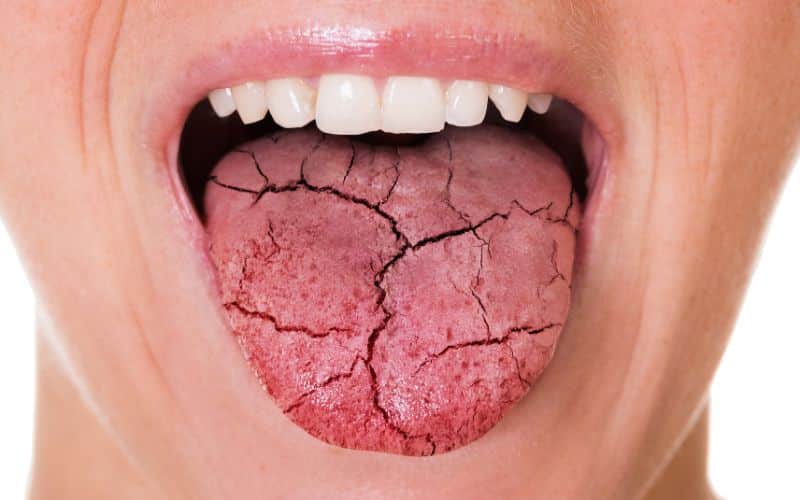
Symptoms of Dry Mouth
A dry feeling in the mouth, or thick saliva are common dry mouth symptoms. There can also be burning sensations and soreness in the mouth, with sensitivity to certain foods. The mouth may be red and shiny, or have a dry, red tongue. It's often difficult to talk and eat, and taste is often diminished. Dry mouth is often accompanied by bad breath, a sore throat and dry nasal passages.Oral Health Concerns
The symptoms of dry mouth are unpleasant, but this condition is also associated with other oral health concerns. Saliva helps to clean the mouth. It rinses away debris, and has components that are antibacterial and antifungal. It also helps to combat viruses. This helps it play a critical role in reducing risks of infections, tooth decay, and gum disease.Tooth Decay
Without the cleaning and antibacterial properties of saliva, teeth are at higher risk of decay, but there are other ways reduced saliva flow impacts the likelihood of tooth decay. Saliva has phosphate and calcium which help prevent damage to teeth. It also neutralizes harmful acids produced by plaque which erodes teeth.Gum Disease
Just as the washing and antibacterial action of saliva helps reduce risks of decaying teeth, it also helps reduce risks of gum and periodontal disease.Thrush (Candidiasis)
Bacterial and fungal infections, such as thrush, are more common when salivary glands don't produce enough saliva. In addition, thrush can aggravate dry mouth, making the situation worse.Problems With Dentures
Patients who wear dentures and aren't producing enough saliva are unable to get a proper suction for their dentures to fit properly. Also, it can make dentures dry out too much, causing them to warp.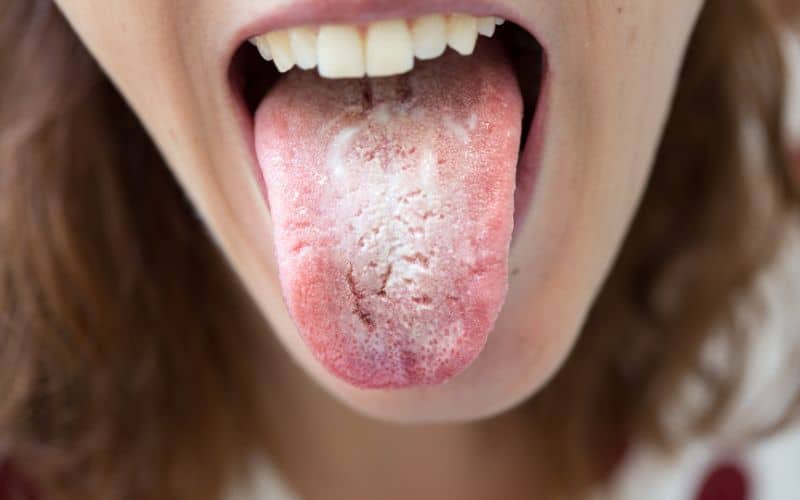
Treat Dry Mouth
Keeping the mouth wet and avoiding foods and drinks that dehydrate, like coffee and alcohol will help. Drinking more water and chewing sugarless gum, preferable with xylitol, will help. Avoid salty, drying, and acidic foods and drinks, and moisten foods with broth or other liquids. Getting a humidifier and not breathing with your mouth open are recommended, too. Talking to your doctor and your dentist will help. Your doctor may recommend alternative medications for your medical condition that are less likely to cause dry mouth, or prescribe drugs to increase saliva production. There are also saliva substitutes.
Scrupulous oral hygiene and regular dental care is critical. Brushing regularly with a prescription fluoride toothpaste, flossing, and using daily fluoride rinses will help. Don't use commercial mouthwashes with alcohol or peroxide, as these will dry your mouth more. More frequent visits to the dentist may be necessary, so plaque buildup can be removed more regularly, and your condition can be monitored, with any concerns being treated right away. Preventative treatments, including topical fluoride, may be completed, too. If you smoke, it's important to quit.
Come visit us at Tooth Buds Dentistry in Orangeville if you have any symptoms of dry mouth.
Dr. Prabhdeep Kaur, a General Dentist, has been enriching the field of dentistry with her expertise for over 13 years, having obtained her license in Canada in 2015. A holder of a BDS degree, Dr. Kaur’s proficiency spans a wide array of dental services, including General and Cosmetic Dentistry, Wisdom Teeth Extractions, Invisalign, and more. Her commitment to her craft is further evidenced by her memberships in prestigious organizations like the Ontario Dental Association, the Academy of General Dentistry, and the Royal College of Dental Surgeons of Ontario.
Renowned for her patient-focused approach, Dr. Kaur emphasizes the importance of listening and customizing treatments to meet individual needs, viewing dentistry not only as a science but also as an art form dedicated to enhancing and restoring smiles. Her dedication to ongoing education ensures she remains at the cutting edge of dental advancements.
Outside her professional life, Dr. Kaur enjoys family time, travel, and cinema, adding a relatable and approachable dimension to her persona. She is passionate about delivering professional and quality dental care, driven by her desire to connect with people and address their dental needs effectively.
Dr. Kaur’s journey in dentistry serves as an inspiration for aspiring dental professionals, advocating determination, motivation, and enjoyment in their work. Follow her journey and professional updates on Instagram @drprabh84, where she continues to inspire both her patients and peers in the dental community.

